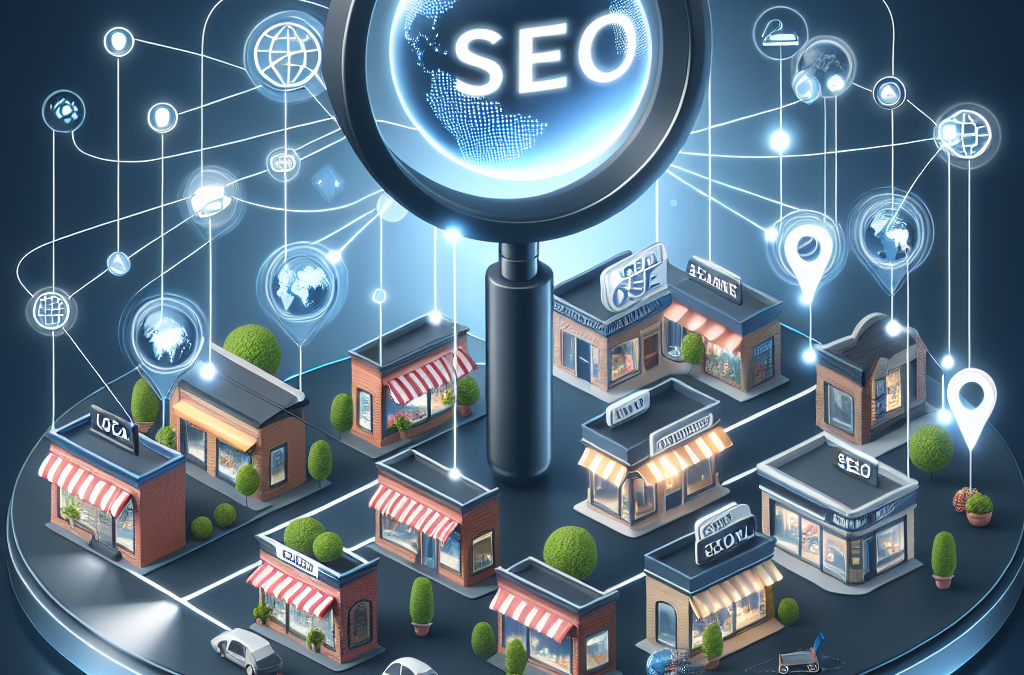Enhanced Online Visibility
Understanding Search Engines
When we’re talking about local marketing, the first thing on my mind is how crucial online visibility is. Think about it—when you Google something, how often do you scroll past the first page of results? Probably not much! That’s why understanding how search engines work is key to getting your business found online.
Search engines use complex algorithms to rank websites based on relevance and authority. By optimizing your website for relevant local keywords, you can increase your chances of appearing at the top of search results. Trust me, being on that first page can mean the difference between thriving and barely scraping by.
Every detail counts, from using the right titles and meta descriptions to implementing schema markup. The more effort you put into optimizing your site, the more the search engines will see you as a credible source, and the better your visibility will become!
The Power of Local Keywords
Let’s dive into keywords because they’re the heart of SEO. Using local keywords is a game-changer. When I first started out, I didn’t fully grasp how crucial local terms were. Once I made the effort to sprinkle them throughout my content, my traffic numbers shot up!
Think about what your customers might be searching for. If you run a bakery in San Diego, there’s a good chance people might be typing in phrases like “best cupcakes in San Diego.” By incorporating these types of phrases into your content strategically, your bakery stands a better chance of ranking higher for those searches.
Plus, there’s an added benefit; local keywords can help improve your website’s relevance and authority in your niche. The more relevant your content is to local searchers, the more likely they’ll engage with your site and, ultimately, your business.
Building Credibility Through Reviews
In my experience, online reviews can totally make or break your local SEO efforts. These testimonials help build credibility and trust, which are super important in today’s market. When potential customers see a wealth of positive reviews, they’re far more likely to choose you over a competitor.
Encouraging happy customers to leave reviews can also boost your online visibility. Search engines often factor in the quantity and quality of reviews when determining local search rankings. So this is something you really can’t ignore!
And don’t forget to engage with reviews, whether they’re good or bad. Responding to reviews shows that you care and are committed to customer satisfaction. This level of engagement can help improve your online reputation and influence potential customers’ decisions.
Targeting the Right Audience
Identifying Your Local Demographics
So, who exactly is your ideal customer? Knowing your target audience is just as important as understanding local SEO. When I decided to focus on specific demographics, everything changed for my marketing strategy. I began attracting the right kind of customers who truly value what I offer.
I recommend diving into insights like age, income, preferences, and location. This information can shape not just your SEO strategies, but your entire marketing approach. From website design to ad targeting, understanding your local audience will help ensure you’re speaking their language.
Moreover, customizing your content to reach specific demographics can improve your local SEO performance. The more specific you can get with your keywords and content, the better chances you have of converting visitors to loyal customers.
Engaging with Community Events
Getting involved in local events is a fantastic way to not just promote your business but also enhance your local SEO. Whether it’s sponsoring a local charity run, hosting a bakery pop-up, or facilitating workshops, being active in your community can really amplify your online presence.
Promote these events on your website and social media. This content can attract local backlinks, which are vital for local SEO. Just being present and engaged helps create a buzz around your business, boosting your credibility in the eyes of both search engines and potential customers.
Community engagement can also provide you with fresh content opportunities for your website. Sharing event highlights and customer interactions can improve your site’s relevance and keep it dynamic—both of which are appealing to search engines.
Leveraging Social Media for Local Reach
Alongside SEO tactics, I can’t stress enough the role of social media in local marketing. Social platforms allow you to connect and promote your business on a local level, targeting audiences based on location. It’s all about building relationships!
Sharing local content, responding to comments, and running targeted ads on platforms like Facebook or Instagram allow you to create a local outreach that can lead to increased online traffic and improvements in your SEO.
Just remember, maintaining consistency is key. Be active and responsive on your social media profiles to keep that connection alive and thriving! The more your audience sees and interacts with your brand, the better your local SEO will benefit.
Improving User Experience
Website Design and Navigation
There’s so much value in having a user-friendly website. After all, what good is SEO if your site is a maze? When I revamped my website to improve navigation, I noticed that my bounce rates dropped significantly, and my engagement rates surged!
Ensure that your website is well-designed and easy to navigate. This not only improves user experience but also signals to search engines that your site is a quality resource. Elements like fast-loading pages, mobile optimization, and easy access to information play a huge role in keeping visitors on your site.
Remember, happy visitors are more likely to convert into customers. By providing a smooth browsing experience, you’ll see the positive effects ripple through your local SEO rankings.
Quality Content is Key
Content is king, right? Well, let me tell you, when I started focusing on providing high-quality, relevant content, I really started to see promising results. Crafting informative and engaging content not only attracts potential customers but also helps establish you as an authority in your local area.
Consider blogs, how-tos, or guides that cater to local interests and needs. The more valuable your content, the more visitors will engage with your site and share it with others. Don’t underestimate the power of well-placed keywords, either—just make sure it flows naturally!
Ultimately, quality content will encourage longer visit durations and lower bounce rates. This, in turn, sends positive signals to search engines, helping to improve your overall SEO efforts.
Use of Visuals and Multimedia
Let’s mix it up a bit! Incorporating visuals like images, videos, and infographics can significantly enhance user experience on your website. I learned this firsthand when I added more dynamic content to my blog posts—it kept visitors engaged for longer.
Not only do visuals break up blocks of text, making your content more digestible, but they also increase shareability on social media. Use images that resonate with local culture or highlight your services to draw in local audiences.
Just make sure to optimize these visual elements for SEO as well—using alt text and proper file names can help your images rank in search results, drawing more attention to your pages.
Measuring and Adapting Strategies
Utilizing Analytics Tools
Measurement is crucial in SEO. I’ve spent countless hours looking at analytic tools, and I can’t highlight enough how valuable they are. Tools like Google Analytics provide insight into how users are interacting with your site and which local keywords are driving traffic.
By assessing data on traffic sources, user behavior, and conversion rates, you’ll get a clearer picture of what works and what doesn’t. This will allow you to fine-tune your strategies for optimal results.
Plus, keeping track of these metrics helps you stay ahead of the competition. If you notice a trend in your local SEO performance, you can proactively adapt your strategies to maintain or improve your standings.
Tracking Local Rankings
It’s vital to keep tabs on how your website ranks in local search results. Knowing your position can help you gauge the effectiveness of your strategies. When I set up regular checks on my local rankings, it became much easier to see where I could improve.
Be aware of fluctuations in your rankings, and don’t hesitate to adjust your SEO tactics accordingly. Whether it means tweaking your keywords or updating your content, remaining agile can help you stay competitive within your local market.
This ongoing process allows you to constantly iterate and enhance your SEO game, ultimately leading to more traffic and conversions down the line.
Implementing Feedback for Improvement
Finally, don’t forget to gather feedback from your customers! Their insights can be invaluable for optimizing your website and marketing strategies. I often ask clients about their experience and what improvements they’d like to see.
This feedback loop will not only help you improve before potential customers can weigh in but gives you a unique perspective that can directly inform your local SEO initiatives. Regularly taking this into account can help you stay connected with your audience.
By adopting this adaptive approach, you’ll foster a sense of community and show your audience that you value their input, leading to enhanced brand loyalty.
Frequently Asked Questions (FAQ)
What is local SEO?
Local SEO is the practice of optimizing your online presence to attract more business from relevant local searches. It focuses not just on general search engine visibility but specifically on optimizing for location-based queries.
How can I improve my website’s visibility in local searches?
Improving visibility requires a combination of effective local keyword use, optimizing your website for user experience, and engaging with your local community through events and social media activities.
Why are online reviews important for local businesses?
Online reviews build trust and, when managed properly, can improve your rankings in local search results. Positive reviews can significantly influence customers’ purchasing decisions and enhance your online credibility.
What role does social media play in local marketing?
Social media is essential for connecting with your audience. It helps you promote local events, engage with community members, and can provide significant boosts to your SEO through increased online activity and backlinks.
How can I track the effectiveness of my local SEO efforts?
You can track effectiveness using analytics tools like Google Analytics. These tools help measure website traffic, conversion rates, and overall engagement, allowing you to adjust strategies and improve your local ranking over time.


